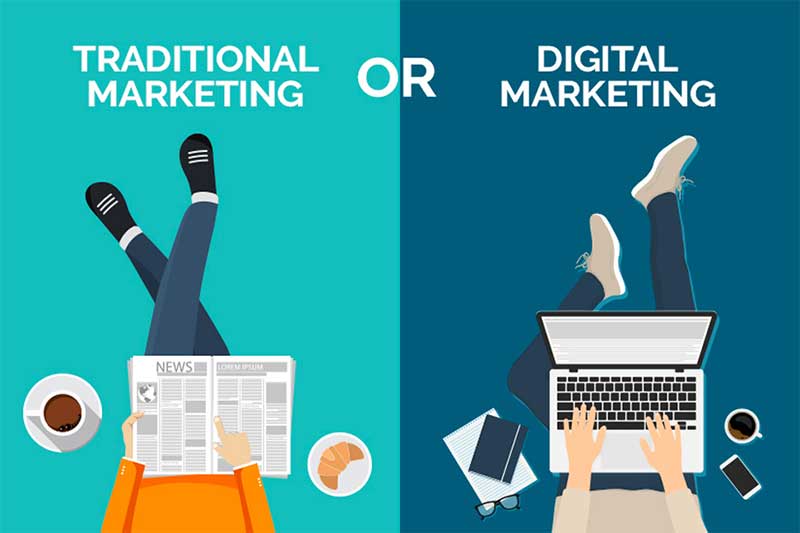Difference between Digital Marketing and Traditional Marketing. There are many ways to make your company grow. Starting from making products or services as attractive as possible, providing features that are interesting to customers, to providing the best service to customers. However, marketing, also known as marketing, is still an important part of the growth of a business.
Introducing, promoting, selling, and distributing goods or services to customers is called marketing. The term digital marketing comes very quickly in today’s digital age. What distinguishes digital advertising from conventional advertising?
Digital marketing is a marketing strategy that uses the internet and digital devices such as computers, mobile phones, and other online platforms to promote products or services. Basically, it is a way to reach potential customers wherever they spend time online.
Difference between Digital Marketing and Traditional Marketing
Traditional marketing relies on conventional media such as TV, radio, newspapers, magazines and billboards. Meanwhile, digital marketing is fully operational in the digital realm. Digital marketing refers to marketing strategies that use the internet and digital technology to reach consumers. It covers a wide range of platforms and methods that enable better interaction and measurement.
Through digital marketing, businesses can interact directly with their target audience. In addition, digital technology helps in personalizing messages and measuring and analyzing campaign effectiveness in real-time. With this advantage, digital marketing allows companies to be more efficient in optimizing marketing budgets and get maximum results than traditional methods.
Traditional marketing refers to marketing strategies that use non-digital media to reach consumers. It covers a variety of methods that have been used for decades, before the advent of the internet. Although it does not have interactive features such as digital marketing, traditional marketing has proven effective for years in building brand awareness and reaching a wider audience. The main advantage of traditional marketing is its ability to create a real physical presence in society. In addition, the message in physical form provides a tactile experience through printed material.
Here are some of the main differences:
- Reach: Digital marketing can reach global audiences more easily and quickly than traditional marketing that tends to be limited to specific geographical areas.
- Targeting: With digital marketing, you can target audiences with a very specific basis based on demographics, interests, online behavior, and more. This is much harder to do with traditional marketing.
- Cost: Digital marketing is often more cost-effective and has a more measurable return on investment (ROI) than traditional marketing.
- Interaction: Digital marketing allows two-way interaction with the audience through comments, messages, or feedback, while traditional marketing tends to be one-way.
- Measurement: Almost all digital marketing activities can be measured by precision (number of clicks, impressions, conversions, etc.), allowing better strategy optimisation. Traditional marketing is harder to measure its effectiveness.
Benefits of Digital Marketing for Business
Digital marketing offers many advantages for businesses in the modern era:
- Wider Range: Businesses can reach audiences globally without geographical restrictions.
- Proper Targeting: Ads and content can be targeted to the most relevant audience segments, increasing the effectiveness of the campaign.
- More Efficient Cost: Often cheaper than traditional marketing methods with greater potential outcomes.
- Data Measurement and Analysis: Campaign performance data can be analyzed in real-time for sustainable optimisation.
- Improve Brand Awareness and Reputation: A strong online presence helps build and strengthen brand image.
- Interaction with Customers: Allows direct communication and builds a loyal community.
- Flexibility and Quick Adaptation: Strategies can be customized quickly following trends or market changes.
Main Components and Digital Marketing Strategies
Digital marketing covers a variety of channels and strategies. Here are some of the most common and effective:
- Search Engine optimisation (SEO): The process of optimizing the content and structure of the website to appear in the top rankings of organic (unpaid) search results in search engines such as Google. The goal is to increase organic traffic to your website.
- Content Marketing: Creation and distribution of valuable, relevant, and consistent content (e.g., blog articles, videos, infographics, e-books) to attract, engage, and retain audience.
- Social Media Marketing (SMM): Utilization of social media platforms (Facebook, Instagram, Twitter, LinkedIn, TikTok, etc.) to build brand awareness, interact with audience, and drive traffic to the website.
- Pay-Per-Click (PPC) Advertising: A paid ad model in which advertisers pay each time their ads are clicked. Examples include Google Ads (advertising in Google search results) and ads on social media (Facebook Ads, Instagram Ads).
- Email Marketing: Sending promotional messages, news, or other information to customer list by email. It is effective for building relationships, promoting products, and encouraging repeated purchases.
- Affiliate Marketing: Pay commissions to third parties (affiliates) who successfully direct customers or sales to your business through their promotions.
- Video Marketing: Using videos to promote products, tell brand stories, or provide educational information. Platforms like YouTube, TikTok, and Instagram Reels are very popular for this.
- Influencer Marketing: Work with individuals who have a huge influence on social media or other platforms to promote your products or services to their followers.
Difference between Digital Marketing and Traditional Marketing
In evaluating the differences between digital marketing and traditional marketing, it is clear that both methods have their respective advantages and disadvantages. Digital marketing offers flexibility, more precise segmentation and advanced analytical capabilities, making it the top choice in today’s digital age. On the other hand, traditional marketing remains relevant to a wide range and its ability to reach an audience that is not digitally connected. The selection between these two strategies depends on the business objectives, the target audience, and the budget available. By understanding the unique characteristics of each method, a business can design an effective and efficient marketing strategy to achieve success.

